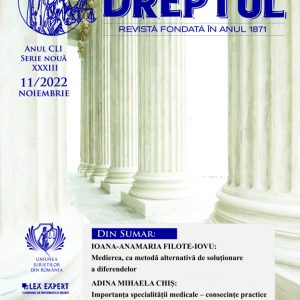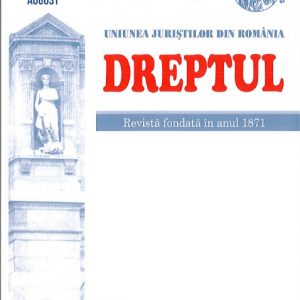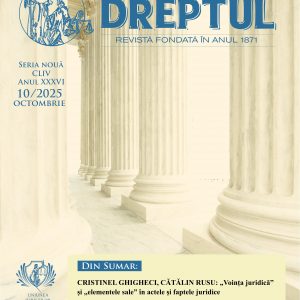-
 In this study, the author proves that the owners’ association does not have the legal capacity to acquire land intended to be used by the association members as parking lots or for ensuring access to the building where the individual dwellings of the members are situated. In this respect, it is claimed that the legal documents for the acquisition of such land by the association are subject to absolute nullity, since they infringe the principle of specialty of the legal entity’s usage capacity, established by art. 34, parag. 1 of Decree no. 31/1954 regarding individuals and legal entities. Consequently, it is concluded that the use of land having the above-mentioned destinations may be acquired by the owners in a condominium only by legal documents concluded in their own names.
In this study, the author proves that the owners’ association does not have the legal capacity to acquire land intended to be used by the association members as parking lots or for ensuring access to the building where the individual dwellings of the members are situated. In this respect, it is claimed that the legal documents for the acquisition of such land by the association are subject to absolute nullity, since they infringe the principle of specialty of the legal entity’s usage capacity, established by art. 34, parag. 1 of Decree no. 31/1954 regarding individuals and legal entities. Consequently, it is concluded that the use of land having the above-mentioned destinations may be acquired by the owners in a condominium only by legal documents concluded in their own names. -
 This study is designed to examine, in the detail, the issue of the administrator liability for the fraud committed against the company. The author have been trying to propose solutions for a series of problems regarding the definition of the expression „fraud against the company”; the discrimination between the fraud and the power abuse, as well as the relation between the sanctions for the exclusion and revoking of the associate administrator, namely when his exclusion applies and when his revoking applies.
This study is designed to examine, in the detail, the issue of the administrator liability for the fraud committed against the company. The author have been trying to propose solutions for a series of problems regarding the definition of the expression „fraud against the company”; the discrimination between the fraud and the power abuse, as well as the relation between the sanctions for the exclusion and revoking of the associate administrator, namely when his exclusion applies and when his revoking applies. -
 As by Article 24 of the Law No 140/2022 the legislator imposed on the National Authority for the Protection of the Rights of Persons with Disabilities and the Superior Council of the Magistracy obligations aimed at assessing the impact of this normative act, accompanied by possible proposals for its improvement, it is obvious that the legislator itself did not exclude that his legislative work does not constitute the masterpiece in the field. In this context, the present approach is intended to continue to emphasize, by the doctrine, some shortcomings of the Law No 140/2022 and to already propose a genuine reform in the matter. In the spirit of respecting the right to dignity of the persons with severe intellectual and psychosocial disabilities, a right that requires that a person who has acquired by law a full capacity of exercise should not be subjected to the degrading treatment of losing, totally or partially, this capacity, in the following we propose to be introduced, in the matter of capacity of exercise, the institutions of assisted capacity of exercise and of supervised capacity of exercise. Consequently, it required either the replacement of the institution of guardianship with the existing one, that of the personal assistant, as the case may be, of the professional personal assistant, or a specialization in the matter of guardianship, for such persons, of the sort of administrative guardianship.
As by Article 24 of the Law No 140/2022 the legislator imposed on the National Authority for the Protection of the Rights of Persons with Disabilities and the Superior Council of the Magistracy obligations aimed at assessing the impact of this normative act, accompanied by possible proposals for its improvement, it is obvious that the legislator itself did not exclude that his legislative work does not constitute the masterpiece in the field. In this context, the present approach is intended to continue to emphasize, by the doctrine, some shortcomings of the Law No 140/2022 and to already propose a genuine reform in the matter. In the spirit of respecting the right to dignity of the persons with severe intellectual and psychosocial disabilities, a right that requires that a person who has acquired by law a full capacity of exercise should not be subjected to the degrading treatment of losing, totally or partially, this capacity, in the following we propose to be introduced, in the matter of capacity of exercise, the institutions of assisted capacity of exercise and of supervised capacity of exercise. Consequently, it required either the replacement of the institution of guardianship with the existing one, that of the personal assistant, as the case may be, of the professional personal assistant, or a specialization in the matter of guardianship, for such persons, of the sort of administrative guardianship. -
 The judicial practice in the matter of representation, including in that of the Supreme Court, reveals difficulties in interpreting Article 84 (1) of the Civil Procedure Code. A poor interpretation thereof, by ignoring ratio legis, creates a gap for the illegal practice of the specialized legal professions. In the same context, it is necessary to distinguish between the plea of lack of evidence of the quality of representative and that of illegal representation, and the latter must be preceded by the plea on the nullity of the contract from which the judicial mandate arises.
The judicial practice in the matter of representation, including in that of the Supreme Court, reveals difficulties in interpreting Article 84 (1) of the Civil Procedure Code. A poor interpretation thereof, by ignoring ratio legis, creates a gap for the illegal practice of the specialized legal professions. In the same context, it is necessary to distinguish between the plea of lack of evidence of the quality of representative and that of illegal representation, and the latter must be preceded by the plea on the nullity of the contract from which the judicial mandate arises. -
 Pursuant to Article 914 of the new (Romanian) Civil Code „The owner of the estate recorded in the land register may request at any time the amendment of the mentions in the land register concerning the description, the destination or its surface, according to the law.” In reference to this text, in the case-law there is a controversy, whether, in the first instance, the jurisdiction ratione materiae lies with the court of first instance or with the tribunal. After examining this issue, the author comes to the conclusion that, de lege lata, presently the jurisdiction lies with the tribunal, according to the rule included in this Article 95 point 1 of the new Civil Procedure Code. Likewise, de lege ferenda, the author proposes that such cases fall within the jurisdiction of the court of first instance, having regard to their nature and their reduced complexity.
Pursuant to Article 914 of the new (Romanian) Civil Code „The owner of the estate recorded in the land register may request at any time the amendment of the mentions in the land register concerning the description, the destination or its surface, according to the law.” In reference to this text, in the case-law there is a controversy, whether, in the first instance, the jurisdiction ratione materiae lies with the court of first instance or with the tribunal. After examining this issue, the author comes to the conclusion that, de lege lata, presently the jurisdiction lies with the tribunal, according to the rule included in this Article 95 point 1 of the new Civil Procedure Code. Likewise, de lege ferenda, the author proposes that such cases fall within the jurisdiction of the court of first instance, having regard to their nature and their reduced complexity. -
 In this study, the author, solving a controversy (generated by the imperfection of the relevant regulatory acts) reaches the conclusion (based on a rational interpretation) that the prefect has the legal competence to exert the administrative guardianship control also on the decisions issued by the president of the county council, whether or not the latter is considered as an authority of the local public administration.
In this study, the author, solving a controversy (generated by the imperfection of the relevant regulatory acts) reaches the conclusion (based on a rational interpretation) that the prefect has the legal competence to exert the administrative guardianship control also on the decisions issued by the president of the county council, whether or not the latter is considered as an authority of the local public administration. -

-
 A special normative act [the Government Emergency Ordinance No 109/2011 on the corporate governance of public undertakings (the autonomous regies established by the State or by an administrative-territorial unit, the national firms and companies, the companies in which the State or an administrative-territorial unit is a sole or majority shareholder etc.)] shall also regulate, as an exception, the situation where such a public undertaking is organized as a joint-stock companies with a sole shareholder. Whereas the legal regulation on such companies is incomplete, the author examines, in this study, a series of legal problems generated by the existence and functioning of such companies.
A special normative act [the Government Emergency Ordinance No 109/2011 on the corporate governance of public undertakings (the autonomous regies established by the State or by an administrative-territorial unit, the national firms and companies, the companies in which the State or an administrative-territorial unit is a sole or majority shareholder etc.)] shall also regulate, as an exception, the situation where such a public undertaking is organized as a joint-stock companies with a sole shareholder. Whereas the legal regulation on such companies is incomplete, the author examines, in this study, a series of legal problems generated by the existence and functioning of such companies. -
 The present article focuses on the legal liability, having as main character the company administrator and presenting an overview of the the sanction specific to the administrator non-patrimonial liability:the administrator revoking. Concomitantly, the problems occurring in the legal practice are also taken into consideration: decision-making competence and the juridical control of the revoking decision. Due to the intuitu personae character of the mandate, the revoking of the company administrator, even when abusive, is final. So, in practice it was stated that the mandate, even arbitrary withdraw, can not be held in justice against the principle‘s will, the only right the proxy has is the claim damages, but not reintegration, as the trust representing the graunds for the mandate can not be imposed. Also, an administrator can not reguest reintegration but, if abuses were committed, by withdrawing the mandate, the administrator has damage claim. In the situation in which the administrators have been appointed by the article of incorporation, their dismissal presupposes its amendament. That is why, the court can not order the administrator‘revoking, as it would mean the modification of the articles of incorporation. In the condition in which the administrator acquired this quality by the company‘s articles of incorporation, his dismissal does not only have the character of an revokingl but it also represents an amendament of the articles of incorporation. The article also includes a detailed analysis of the opinions expressed in the speciality literature and the solutions in the legal practice for the administrator revoking problem.
The present article focuses on the legal liability, having as main character the company administrator and presenting an overview of the the sanction specific to the administrator non-patrimonial liability:the administrator revoking. Concomitantly, the problems occurring in the legal practice are also taken into consideration: decision-making competence and the juridical control of the revoking decision. Due to the intuitu personae character of the mandate, the revoking of the company administrator, even when abusive, is final. So, in practice it was stated that the mandate, even arbitrary withdraw, can not be held in justice against the principle‘s will, the only right the proxy has is the claim damages, but not reintegration, as the trust representing the graunds for the mandate can not be imposed. Also, an administrator can not reguest reintegration but, if abuses were committed, by withdrawing the mandate, the administrator has damage claim. In the situation in which the administrators have been appointed by the article of incorporation, their dismissal presupposes its amendament. That is why, the court can not order the administrator‘revoking, as it would mean the modification of the articles of incorporation. In the condition in which the administrator acquired this quality by the company‘s articles of incorporation, his dismissal does not only have the character of an revokingl but it also represents an amendament of the articles of incorporation. The article also includes a detailed analysis of the opinions expressed in the speciality literature and the solutions in the legal practice for the administrator revoking problem. -
 Introducere. La nivel constituțional, principiul referitor la activitatea legii penale a fost consacrat odată cu adoptarea Constituției României din 1991, iar, după revizuirea din anul 2003, principiul a fost extins și cu privire la legea contravențională. Potrivit art. 15 alin. (2) din Constituție, „Legea dispune numai pentru viitor, cu excepția legii penale sau contravenționale mai favorabile.” Transformarea unui principiu legal într-unul constituțional are și importante semnificații juridice, pentru că „neretroactivitatea legii, ca principiu constituțional, este obligatorie pentru toate ramurile de drept, fără excepție, nu numai pentru acelea care îl prevăd explicit. Apoi, în afara excepției stabilite prin Constituție, nicio altă excepție nu poate aduce limitări acestui principiu constituțional, orice alte prevederi legale contrarii trebuind a fi considerate neconstituționale și putând fi atacate pe căile controlului de constituționalitate”1.
Introducere. La nivel constituțional, principiul referitor la activitatea legii penale a fost consacrat odată cu adoptarea Constituției României din 1991, iar, după revizuirea din anul 2003, principiul a fost extins și cu privire la legea contravențională. Potrivit art. 15 alin. (2) din Constituție, „Legea dispune numai pentru viitor, cu excepția legii penale sau contravenționale mai favorabile.” Transformarea unui principiu legal într-unul constituțional are și importante semnificații juridice, pentru că „neretroactivitatea legii, ca principiu constituțional, este obligatorie pentru toate ramurile de drept, fără excepție, nu numai pentru acelea care îl prevăd explicit. Apoi, în afara excepției stabilite prin Constituție, nicio altă excepție nu poate aduce limitări acestui principiu constituțional, orice alte prevederi legale contrarii trebuind a fi considerate neconstituționale și putând fi atacate pe căile controlului de constituționalitate”1. -
 In the practice of the courts there is a controversy on the problem of determining the litigants in the cases regarding the contestation against execution in relation to the sanction of performing a community service activity, whereas the prescription of execution of that sanction has occurred. This study, after stating all the facts, gives a solution therefor.
In the practice of the courts there is a controversy on the problem of determining the litigants in the cases regarding the contestation against execution in relation to the sanction of performing a community service activity, whereas the prescription of execution of that sanction has occurred. This study, after stating all the facts, gives a solution therefor. -
 The various methods and means used by the offenders committing murder for the purpose of getting away of the victim’s body subsequent to its commitment, provide the authors the occasion to issue certain comments related to the constituent content of the grave violation offence set forth in art 319 of the Criminal Code, in the manner of a body profanation, based upon a non-unitary judicial practice despite the advance of a solution within a recourse in the interest of the law.
The various methods and means used by the offenders committing murder for the purpose of getting away of the victim’s body subsequent to its commitment, provide the authors the occasion to issue certain comments related to the constituent content of the grave violation offence set forth in art 319 of the Criminal Code, in the manner of a body profanation, based upon a non-unitary judicial practice despite the advance of a solution within a recourse in the interest of the law.
